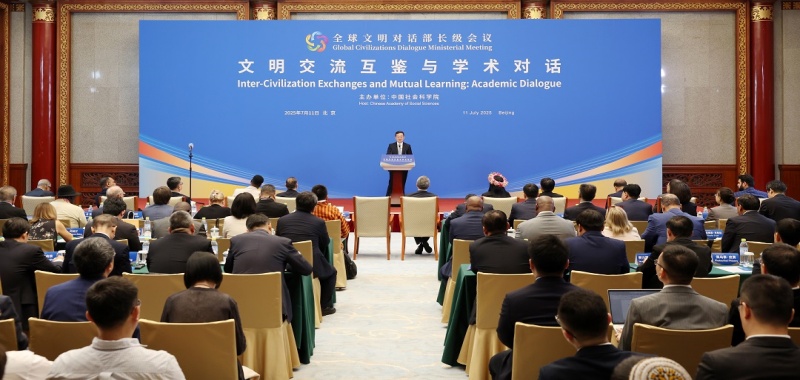


Promoting inter-civilization exchanges and mutual learning through academic dialogue
On July 11, the sub-forum themed on “Inter-Civilization Exchanges and Mutual Learning: Academic Dialogue,” part of the Global Civilizations Dialogue Ministerial Meeting and hosted by the Chinese Academy of Social Sciences (CASS), was held in Beijing. CASS President Gao Xiang attended the opening ceremony and delivered a keynote speech. Hong Dayong, deputy head of the Publicity Department of the CPC Central Committee, was also present. The opening session was chaired by CASS Vice President Zhao Rui.

A scene of the forum Photo: Zhu Gaolei/CSSN
Gao noted that President Xi Jinping’s congratulatory letter to the Global Civilizations Dialogue Ministerial Meeting fully reflects the Chinese government’s strong commitment to promoting inter-civilization exchanges and mutual learning. The letter, written from a strategic perspective on the sustainable development of human civilization, underscores the vital role such exchanges play in advancing human progress and fostering global peace and development. It also provides essential guidance for civilizational dialogue worldwide.
Gao emphasized that academic dialogue is a key vehicle for advancing the Global Civilization Initiative (GCI) and enhancing mutual understanding across cultures. In an era marked by increasingly complex global challenges, scholars must delve into history and cultural traditions to extract wisdom for addressing contemporary problems. Intellectual inquiry and humanistic values should serve as a wellspring for the ongoing advancement of human civilization. Gao called for a deeper exploration of the historical experience of civilizational exchanges, for telling compelling stories of mutual learning, and for maintaining sound views on development, security, and global order. He also advocated for continued research into the history of WWII to reinforce shared commitments to peace and to build a strong intellectual bulwark against war.
Gao further urged systematic and in-depth studies on the historical trajectories, current realities, and defining features of modernization across different nations, to identify common patterns and reshape the civilizational logic underpinning diverse development paths. He affirmed that CASS stands ready to work with experts, scholars, and thought leaders worldwide—through academic exchanges, joint research, and other collaborative efforts—to implement the GCI, build a human community with a shared future, and jointly envision a new landscape of global modernization.
At the opening ceremony, a number of political leaders and representatives from various countries delivered speeches successively, including: Jhala Nath Khanal, a senior leader of the Communist Party of Nepal (Unified Socialist) and former prime minister of Nepal; Hon Gardenia Aisek, secretary of Education of the Federated States of Micronesia; Gloria Thomas, minister for Social & Community Development, Housing, and Gender Affairs, and chairman of the National Democratic Congress of Grenada; Vansy Kouamoua, deputy minister of the Ministry of Culture and Tourism of LAO PDR; Flavio Brandao Mendes De Araujo, secretary general of the Democratic Party of East Timor in Dili and deputy minister of Health of the Government; Kem Sambath, a member of the Central Committee and vice chairman of the Commission for External Relations of the Central Committee of the Cambodian People’s Party; Nazrul Islam Khan, the standing committee member of the Bangladesh Nationalist Party and former ambassador to Kuwait and Yemen; Aye Maung, chairman of the Arakan Front Party of Myanmar; and Nicholas Morris, parliamentary secretary in the Ministry of Foreign and CARICOM Affairs and in the Office of the Prime Minister, the Republic of Trinidad and Tobago.
They emphasized that the history of humanity is, fundamentally, a history of civilizational development and interaction. As the world confronts numerous challenges, the importance of inter-civilization dialogue is becoming increasingly evident. The GCI’s calls for dialogue, cooperation, mutual respect, and inclusive development have received broad recognition and enthusiastic support from the international community. Countries should actively support and implement the GCI, strengthen solidarity and cooperation, and work to deepen mutual understanding and trust in order to advance global peace, stability, and development.
The forum featured two academic salons: “Promoting Mutual Learning Among Civilizations Through Academic Dialogue” and “Advancing Civilizational Progress Through Knowledge Innovation.”
More than 100 participants—political leaders, government officials, and scholars—from over 20 countries and regions, including Australia, Portugal, Argentina, Honduras, and Nigeria, gathered for in-depth discussions on strengthening inter-civilization exchanges and dialogue and promoting world peace and development.
Editor:Yu Hui
Copyright©2023 CSSN All Rights Reserved